Recipe Cards now available in the Just Like Oma Shop!
Is Oktoberfest Bavarian or German? And Yes, it Matters
By: Eran Fulson Canadian-Born, German-Raised Blogger
Published: July 23, 2025
If you've ever held a pretzel the size of your head in one hand and a beer stein in the other, you're not alone. Oktoberfest is celebrated around the world, but here's the real question:
"Is Oktoberfest German?"
It's a pretty definitive Yes, but with a big, metaphorical asterisk next to it. Oktoberfest is a Bavarian tradition that became internationally associated with German culture. It started, and still lives, in the Bavarian capital of Munich. But does it really matter whether you call it German or Bavarian? Also yes.
I’ll skim the history in this post, but more importantly, explain why this one regional celebration has become the global face of German identity. And what that means for German heritage families trying to pass on culture with a little more accuracy (and fewer clichés).
Table of Contents:
So, What is Oktoberfest?
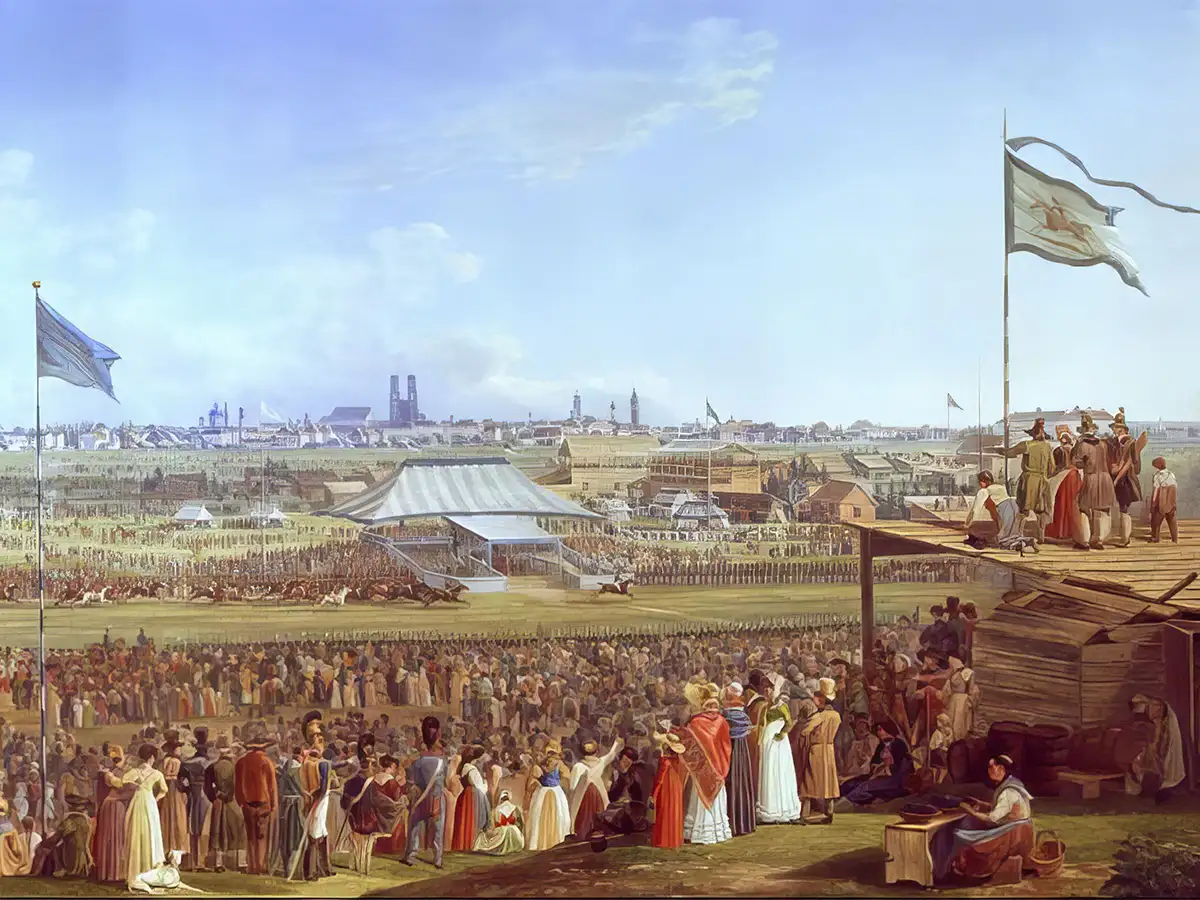 Oktoberfest - Painting by Adam Pferderennen in 1823
Oktoberfest - Painting by Adam Pferderennen in 1823Oktoberfest began in 1810 as a celebration of the marriage between Crown Prince Ludwig of Bavaria and Princess Therese of Saxony-Hildburghausen. There was a horse race, a crowd of locals, and probably a decent amount of sausage.
It went so well, they decided to do it again the next year, and then again, and again. Eventually the horses were dropped, and the beer took center stage. Priorities clearly on point.
Over time, Oktoberfest became the festival we recognize today: big tents, bigger steins, traditional Bavarian food, and a steady soundtrack of brass bands. It technically starts in September (better weather), wraps up in October, and draws millions of visitors to Munich every year.
Is Bavaria a Part of Germany?
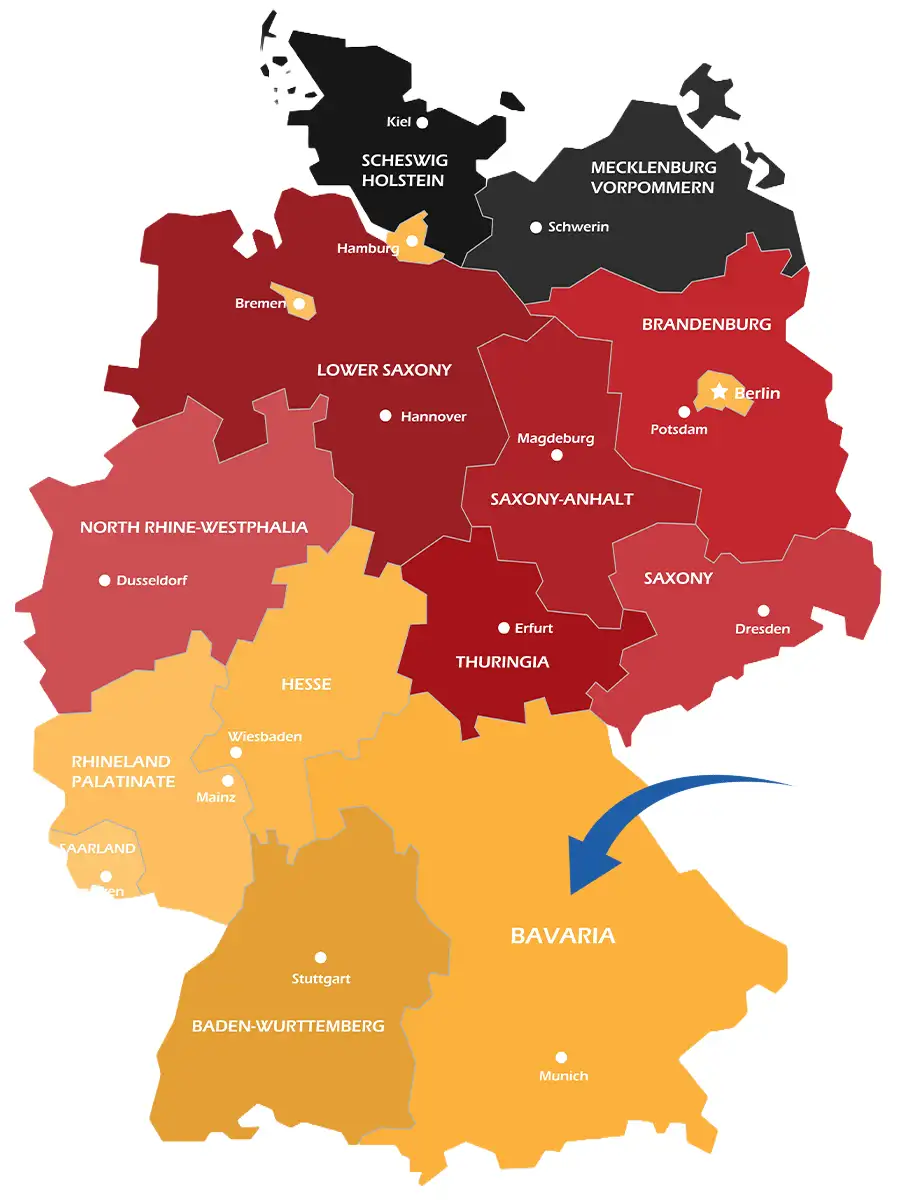 Bavaria - One of 16 Federal States
Bavaria - One of 16 Federal StatesYes. Bavaria (Bayern) is one of Germany's 16 federal states, but it's also culturally distinct. Think of it like Texas in the U.S. or Québec in Canada: part of the country, but proud of its own identity, customs, and even dialects.
Bavaria is predominantly Catholic, has a strong folk tradition, and its residents are known for being especially proud of their heritage. Munich, the state capital, is home to the original Oktoberfest, and many Bavarians consider it a symbol of their unique cultural identity.
Why do People Think Oktoberfest is German?
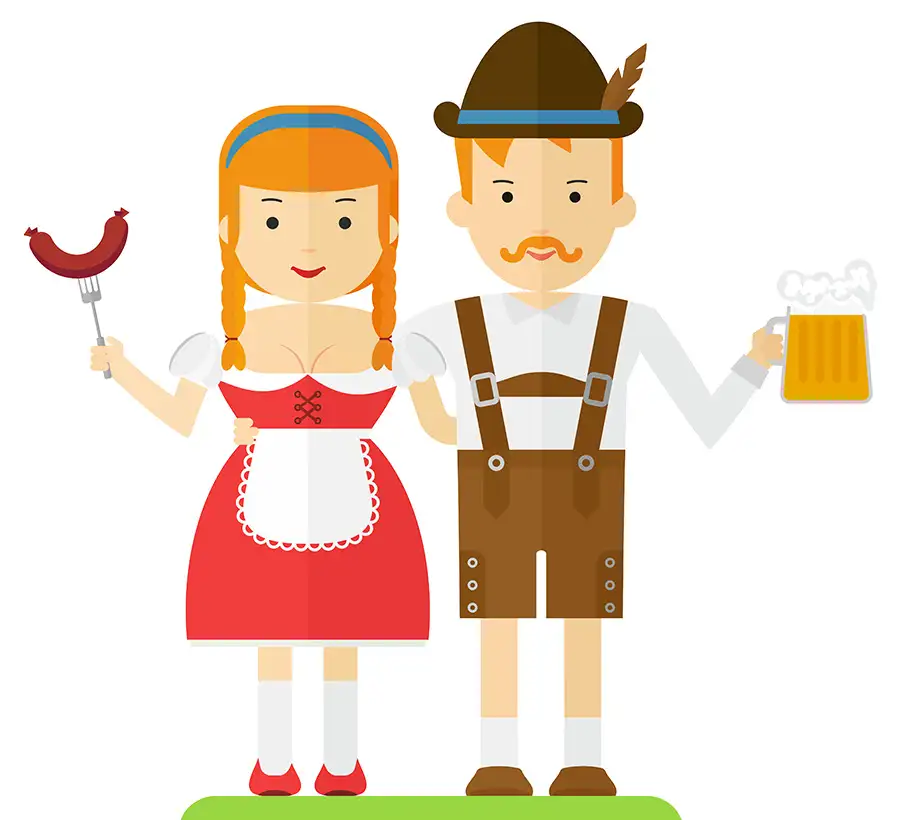 One side of a 16-sided cultural coin
One side of a 16-sided cultural coinTechnically, it is. Oktoberfest started in Germany, in Munich, specifically, so it’s not wrong to call it German. But it’s a bit like assuming all Americans wear cowboy hats because you’ve seen one rodeo.
Over the years, Oktoberfest became the global mascot for “German culture,” thanks to Germans living abroad, a fair bit of tourism marketing, and the fact that lederhosen and beer are very photogenic. It’s catchy. It’s iconic. And it makes people think all of Germany celebrates the same way, which isn’t quite the case.
In reality, Oktoberfest is mostly a Bavarian thing. The rest of Germany? They’ve got their own festivals. Some with costumes, some with satire, and some that don’t involve beer at all.
Regional Differences Across Germany
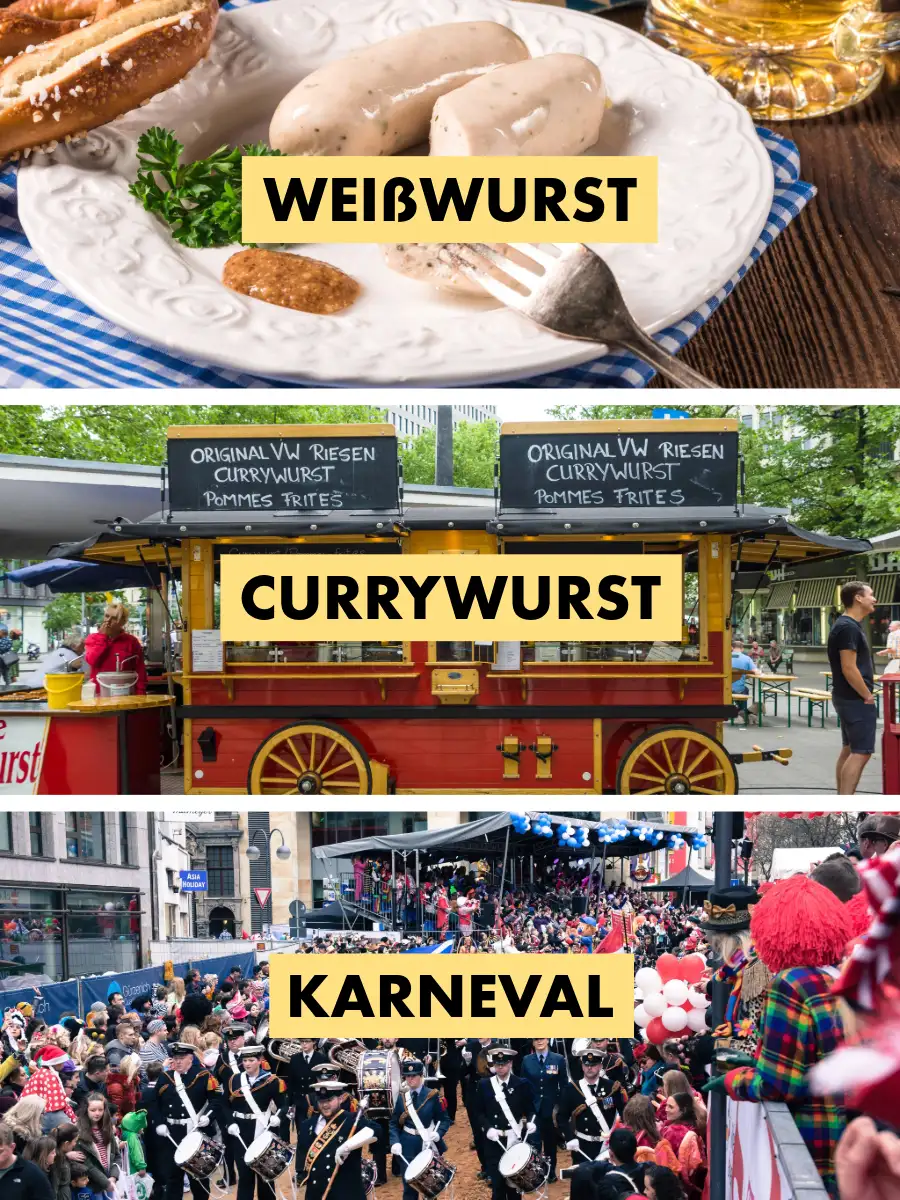 United by "Germany" but very much unique
United by "Germany" but very much uniqueGermany isn’t a cultural monolith. What counts as "typical German" in one region might feel completely foreign in another.
- In Bavaria, you’ve got Weißwurst before noon, Dirndls at weddings, and people who can polka without irony.
- Berliners are more about Currywurst, kebabs, and late-night techno.
- And in the Cologne, Karneval turns the whole city into a costume party every February.
Oktoberfest is a big deal, in Bavaria. Elsewhere? Not so much.
How Oktoberfest Became a Global Brand
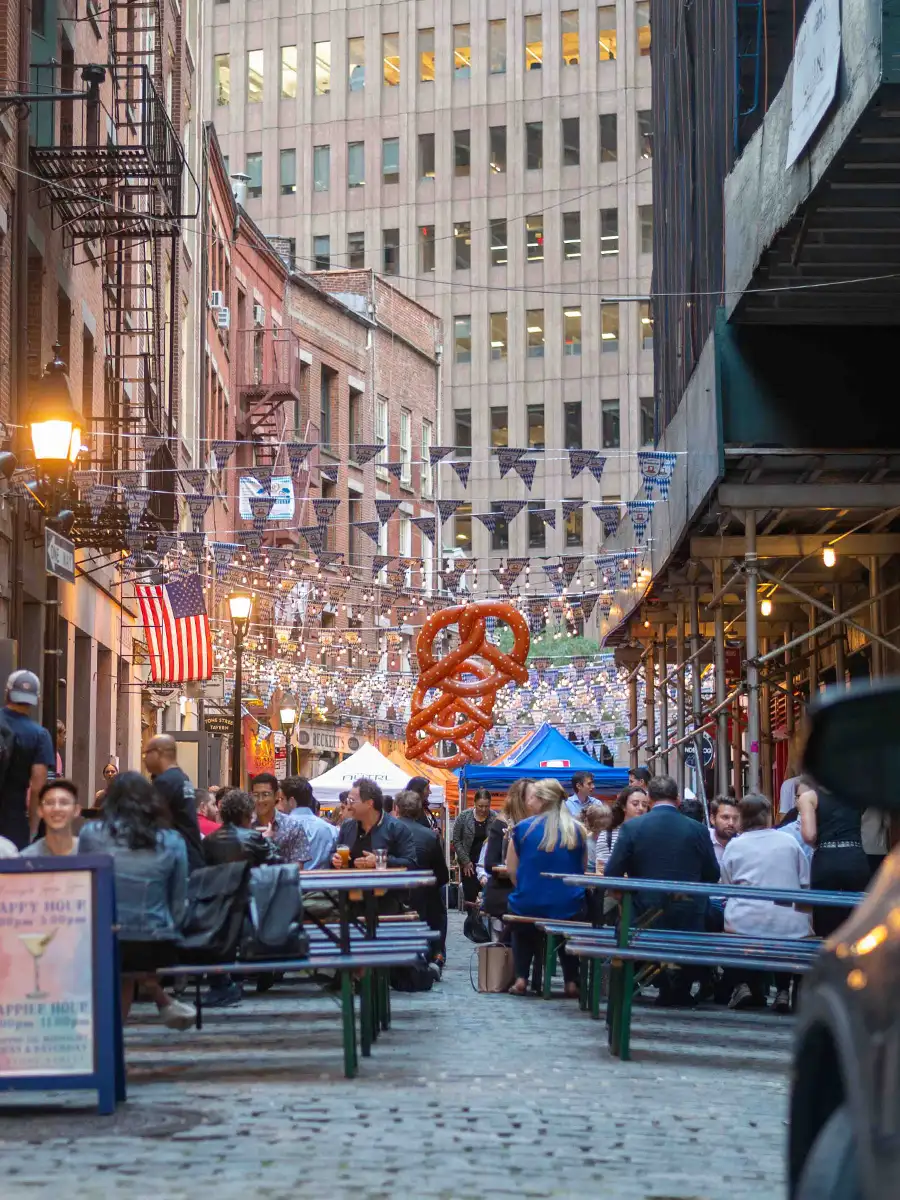 Oktoberfest in New York
Oktoberfest in New YorkOnce Oktoberfest hit the international circuit, it took on a life of its own.
German immigrants brought parts of their culture abroad, but Oktoberfest was the easiest to package: you’ve got visuals (lederhosen), food (pretzels), and universal appeal (beer!).
In places like the U.S., Canada, and Australia, Oktoberfest became a cultural event that often bore little resemblance to its Bavarian roots. Lederhosen, beer steins, and accordion music became the uniform of "German" festivals everywhere.
And somewhere along the way, Oktoberfest stopped being "a Bavarian thing" and started being "the German thing."
Many would argue that Oktoberfest in Munich has become over-commercialized and cliché. And that's true in some respects. However, the underlying feeling among many of the attending Bavarians is that it's a celebration, and one to share.
It's best summed up by 60-time Oktoberfest regular Günter Werner in his interview with Muenchen Travel:
"The encounters. The togetherness. The solidarity. That's what they say in Munich: Hoit ma zam! (Let's stick together!) Especially in times like these, togetherness is so important, and that's what the Oktoberfest has always stood for: Everyone comes together if anyone else, no matter who, wants to sit at the table."
Why This Matters for Heritage Families
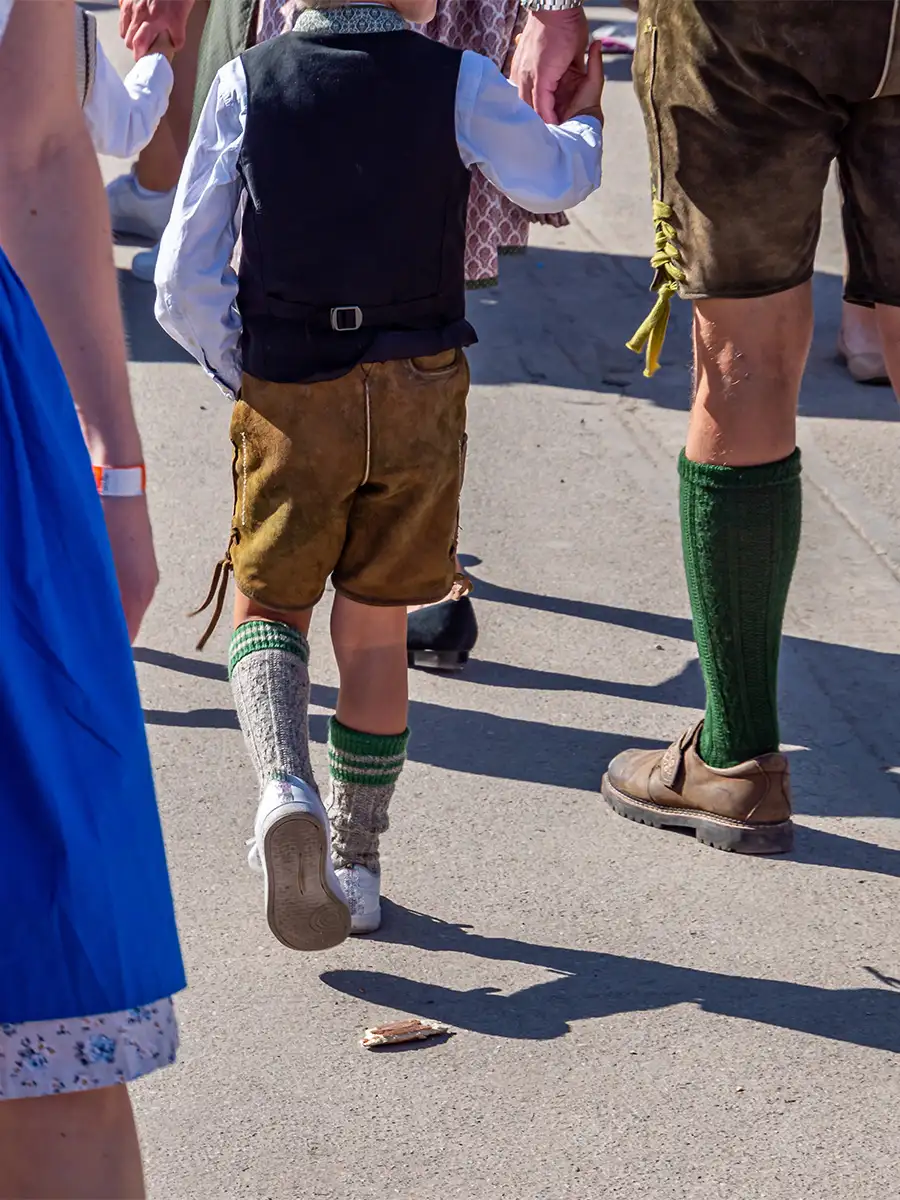
If you’ve got German ancestry, there’s a good chance your roots go beyond beer tents. Maybe your family came from the North, where pickled herring is more popular than pretzels. Maybe they had zero interest in Oktoberfest. That doesn’t make your heritage less German, just a different kind of German.
Teaching your kids about Oktoberfest? Great. But use it as an opportunity to explain the regional differences in German culture, and that Bavaria is just one piece of the puzzle.
Try using resources like old immigration documents or an ancestry site to find out where your family originated. Then, look into festivals, foods, or dialects specific to that region.
You don’t have to pick sides. Oktoberfest is Bavarian, and that makes it German. But if you're digging into your own heritage or teaching your kids what it means to be German, knowing the difference between regional pride and national branding is powerful.
Celebrate Oktoberfest. Enjoy the Brezn and brass bands. But let it be a doorway into something meaningful.
FAQ - Quick Answers to Common Questions
Why do people think Oktoberfest is German?
Why do people think Oktoberfest is German?
Because it originated in Germany, specifically, in the Bavarian capital of Munich. But global celebrations have made it seem like a nationwide tradition when it's mostly regional.
Is Oktoberfest celebrated everywhere in Germany?
Is Oktoberfest celebrated everywhere in Germany?
Not exactly. While Oktoberfest-style events happen in many cities, they vary in scale and authenticity. Outside of Bavaria, you’re more likely to find other folk traditions taking precedence.
Is Oktoberfest the same in every country?
Is Oktoberfest the same in every country?
No. Celebrations in places like the U.S. or Canada often mix local customs with the Bavarian aesthetic. Many are more about beer than tradition.
What are some other regional German festivals?
What are some other regional German festivals?
- Schützenfest (Lower Saxony)
- Karneval (Cologne & Rhineland)
- St. Martin’s Day (widespread but strongest in Western Germany)
What does "Volksfest" mean?
What does "Volksfest" mean?
A Volksfest is a folk festival. Oktoberfest is one type. Many regions have their own versions that reflect local traditions.
A Quick Note from My Side of the Family
We never really went in on Oktoberfest growing up. No family traditions, no beer tent nostalgia. There’s supposedly a photo of me in lederhosen floating around somewhere. But if it exists, it hasn’t won't have surfaced in time to make this post.
My family emigrated from Berlin. They appreciated Bavarian culture, sure, but the cultural hand-me-downs that made it across the ocean were mostly food-based, and they tasted distinctly Berliner.
It wasn’t until I moved to Toronto, and later traveled overseas, that I really clocked how Germans are perceived from the outside: Oktoberfest, soccer, and a sense of humor that’s apparently MIA. That distance made the German stereotype more obvious, and more interesting.
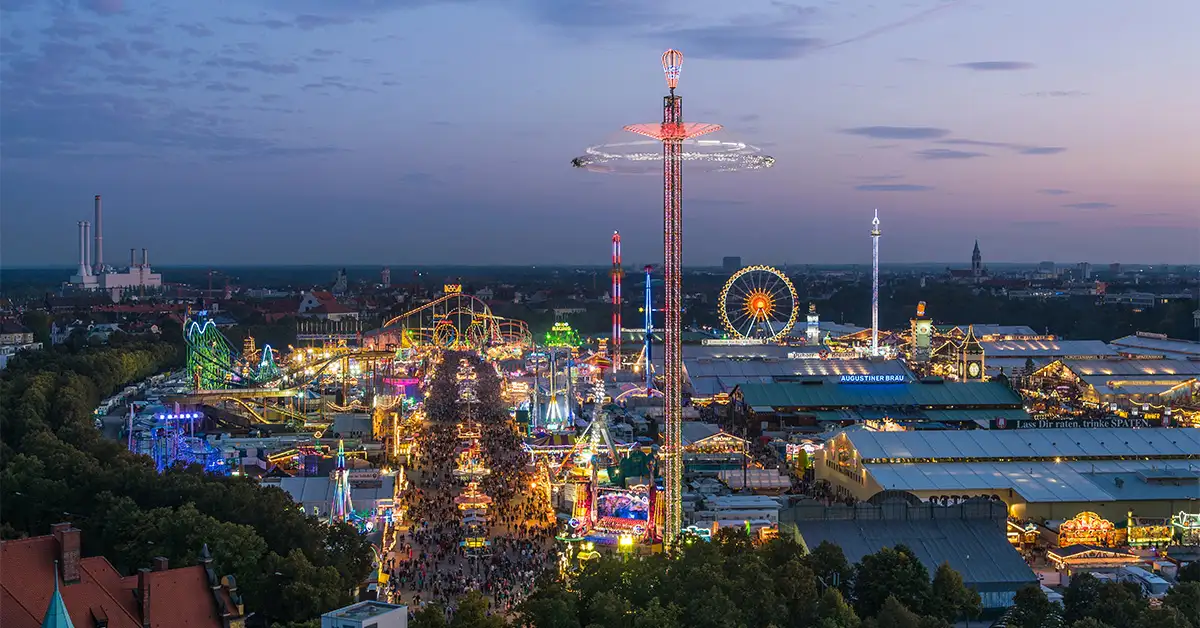
Now that my kids are old enough to start asking about heritage, we’re going all in. Not just on Oktoberfest, but on learning where our traditions fit. Which ones we borrow. Which ones we pass on. And which ones we leave behind because they don’t tell our story.
So no, Oktoberfest wasn’t a big part of my childhood. But maybe that’s exactly why I’m paying attention now. It’s a single thread to pull. And I’m curious where it leads.





























